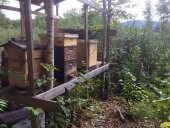John Polk wrote:It appears from that site ( http://www.honeybeegenetics.com/bees.html ), that the Carniolan Russians have been bred for 100+ years with NO chemical intervention. This has allowed the breed to build up a natural resistance to the mites.
IMO, the less human intervention, the best overall health. Nature has her own ways for dealing with illness.
Time proven - if we just give it a chance.
John,
I do agree with your general conclusion on bee health and Nature working things out for the best - in the long run. If the subject of Hive Management was placed on a continuum - I would definitely lean towards your ideas. Many years ago I read Masanobu Fukuoka's "One Straw Revolution" and it influenced me a great deal.
However, I do feel that low impact, low cost, natural methods and materials to benefit my existing colonies is a common sense way of building a natural honey production business. True, I don't do Bees for money. That is not my sole motivation. Yet, when I lose a hive to mites or whatever it is a serious thing for me - not just an academic one.
By using a combination of varroa screens, essential oils mixed into 1:1 syrup, and an occasional sugar powdering - I am able to save and help my colonies. This in turns helps my honey production and helps to pay my mortgage, my bills and taxes. I know this sounds rather crass - but this is the real world for many of us beekeepers. Finding the 'middle way' is where the tension is. Sure, I could use formic acid and other chemical treatments and have less loss on one extreme or I could just them them die off 'naturally' and let nature work it out in the long run. I just don't have that kind of time or mindset!
Concerning CDD:
When I went to one of my yards this spring - near an area of heavy commercial agriculture activities - I opened up 4 colonies to discover that every one of them was empty. Yeah. Empty. A typical 'dead-out' has a pile of dead bees at the bottom of the hive. There were none. This observation conforms to the symptoms observed as CCD. Do I have absolute proof? No. I don't . However, I am very passionate about my colonies and this tore my heart out. If I did not leave them enough stores of honey - I would blame myself. This was NOT the case. The hives were full of honey frames. Plenty of food.
This is where my concern and yes, unfortunately, my anger kicks in. Partly because my frustration is great because there is nothing I could have done to prevent this loss. Other people are using something in the environment that is harming my honey bees. There are so many variables... so many possibilities... it is SO hard to isolate a root cause.
However, at my isolated bee yard - 6 miles from the nearest farm I had no losses. They are thriving. Why could that be?
To quote Bob Dylan, "You don't need a weatherman to know which way the wind blows"
So, in short my experience over the years can be summarized as follows:
Italian bees are wonderful and they build up pretty fast in the Spring. I have used them for several years. However, they don't winter as well and have greater winter losses
Carnolian bees are better for the winter survival and do pretty well.
However, the Russian/Carnolian bees that I originally purchased from Honey Bee Genetics seem to do the best in our environment. I have grafted from one outstanding queen that lived for 3 Winters here! Imagine that!
Her daughters are doing very well and I have only lost one of these - in that Orchard for what appears to be a CCD related incident.
I am hoping to raise more these queens and offer them to interested bee keepers to try.
As always, I appreciate your comments and ideas.
Thanks!
Will Olson

 2
2




 2
2




 1
1




 1
1




 1
1




 1
1





 1
1





 1
1





 1
1




 1
1









 1
1











